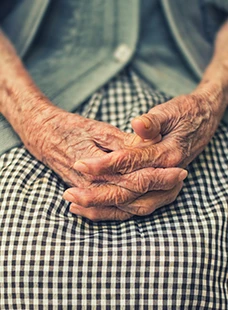
B.O. is the principal caregiver for her 88 year old mother, who suffers from Alzheimer’s. She’s also a caring mentor to the children she teaches to read. Now, in the midst of an unprecedented public health crisis and as her mother’s mental and physical health deteriorates, the school year is resuming. Can she do both? Not without more help from home-based health care aides.
“My mother cannot be left alone,” she says. “She’s at risk for falls. She won’t eat if she’s left alone. She gets disoriented.”
B.O. considers herself and her mother to be relatively “fortunate”, as her mother is enrolled in Florida’s Long-term Care (LTC Waiver), a program funded by Medicaid and administered by managed care organizations. The program, which provides home and community based services (also referred to as “HCBS”), is an alternative to nursing homes. Her mother spent a year on the waitlist for long-term care. B.O. could have sent her to a nursing home without any waiting, but that was not what she wanted. And now, with COVID-19, a nursing home is unthinkable. But B.O. and others in her position need much more help than they have been getting since the onset of COVID-19.
“My mother used to receive almost 60 hours a week of care,” she says. “Now it has dropped to 28 hours a week. And I had to fight for that much. There is no justification or explanation.”
Prior to COVID-19, her mom attended an adult daycare, one of the long-term care benefits. Her Medicaid plan also provided 18 hours a week of home health care services.
But with COVID-19, adult day care centers closed. Forty hours of weekly care vanished overnight. She reminded the managed care plan’s case manager that her mother needed 24/7 care. Even after fighting with the company, B.O. was left providing 148 hours a week of care to her mother on her own.
“My mother used to receive almost 60 hours a week of care,” she says. “Now it has dropped to 28 hours a week. And I had to fight for that much. There is no justification or explanation.”
With COVID-19, the need to keep her mother safe at home is greater than ever but B.O. doesn’t see how that can happen now. She can’t afford to give up her part-time teaching job, nor can she leave her mother unattended.
“I also have to take care of my health and need to minimize my exposure to the virus,” B.O. says. Her remote teaching job allows her to do that. “I can’t afford to get sick because I’m it. I’m my mother’s caretaker.”
Post-script: After a successful appeal, B.O. got approval for 38 hours a week of home healthcare. But these hours are reconsidered monthly. B.O. fervently hopes that they will not be discontinued.
####
To help caretakers like B.O. understand the program better, FHJP has developed a consumer flyer on Medicaid Home & Community Based Services (HCBS): “Know Your Rights Flyer” , a consumer HCBS information video and a more detailed “Advocate’s Guide to the Florida Long-Term Care Waiver.” Information is provided to both caretakers and their advocates on applying for the program and trouble-shooting problems.

Florida Health Justice Project engages in comprehensive advocacy to expand health care access and promote health equity for vulnerable Floridians.
A copy of the official registration and financial information may be obtained from the division of consumer services by calling 1-800-HELP-FLA (435-7352) toll-free within the state. Registration does not imply endorsement, approval, or recommendation by the state.